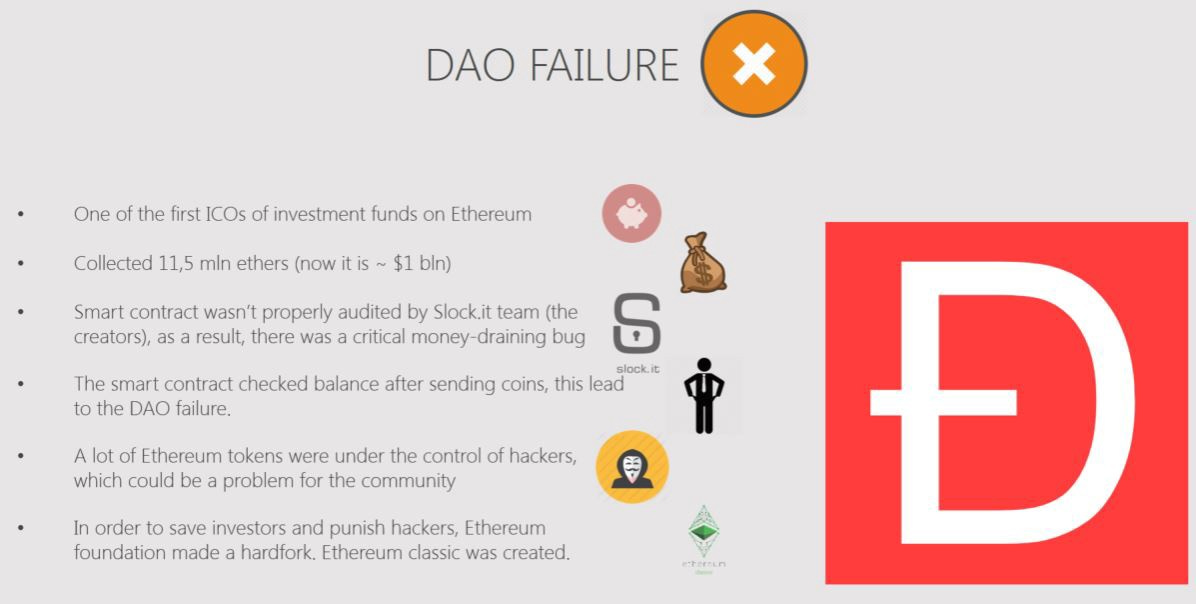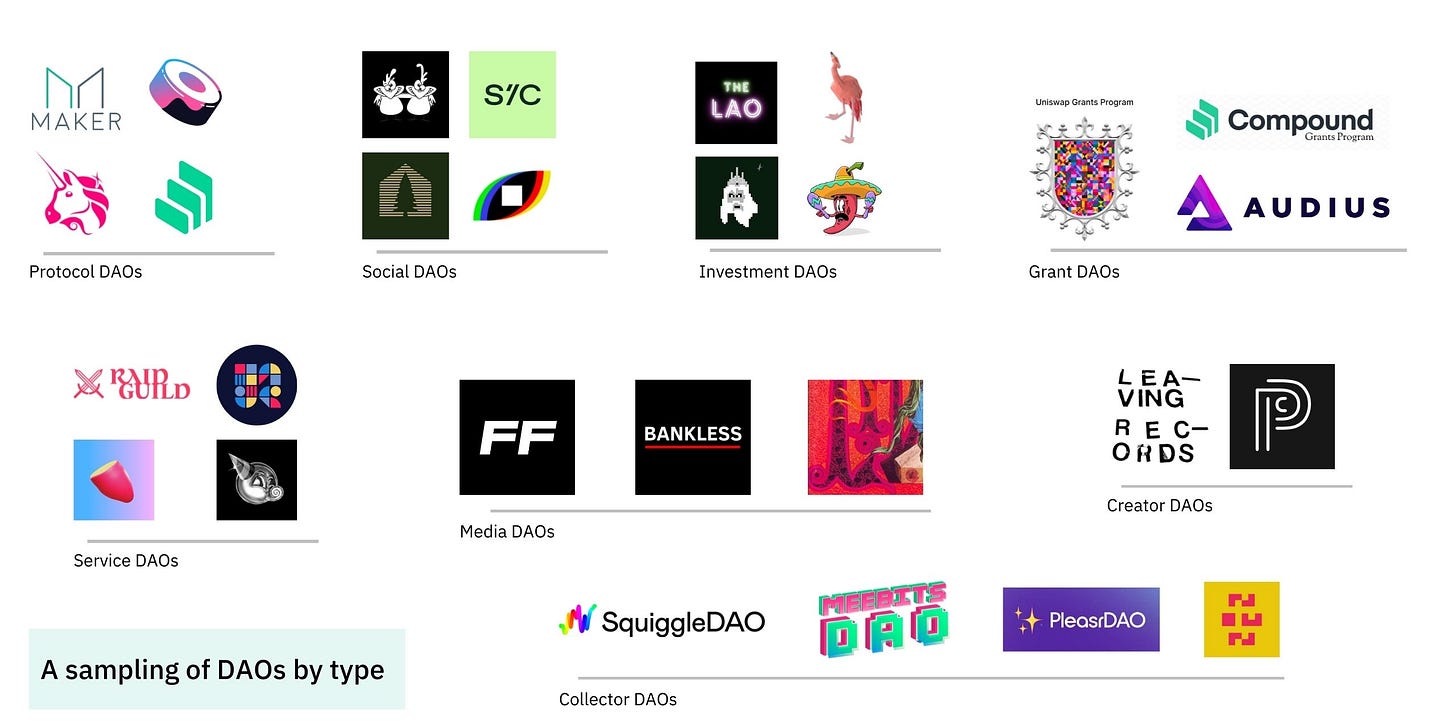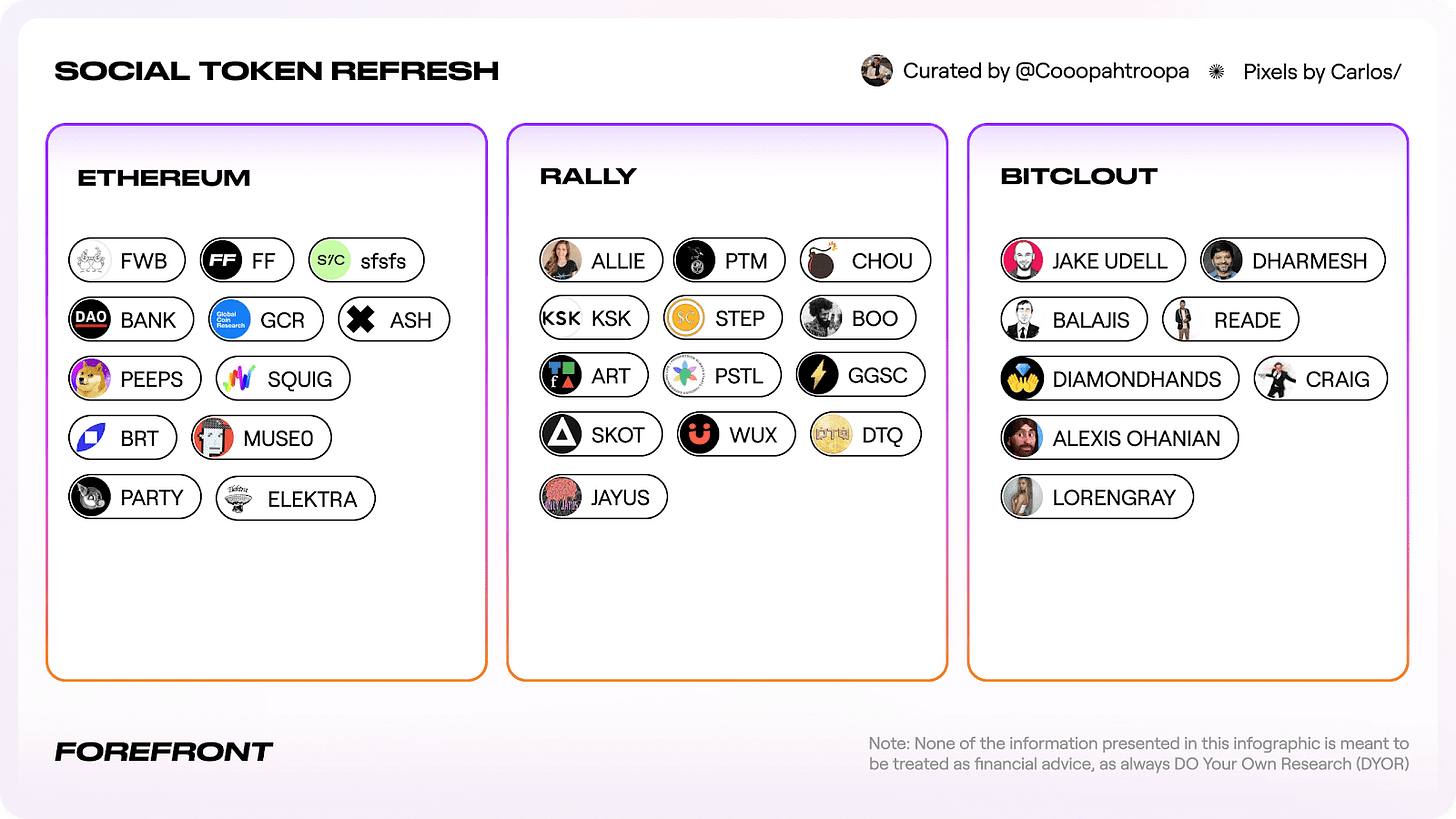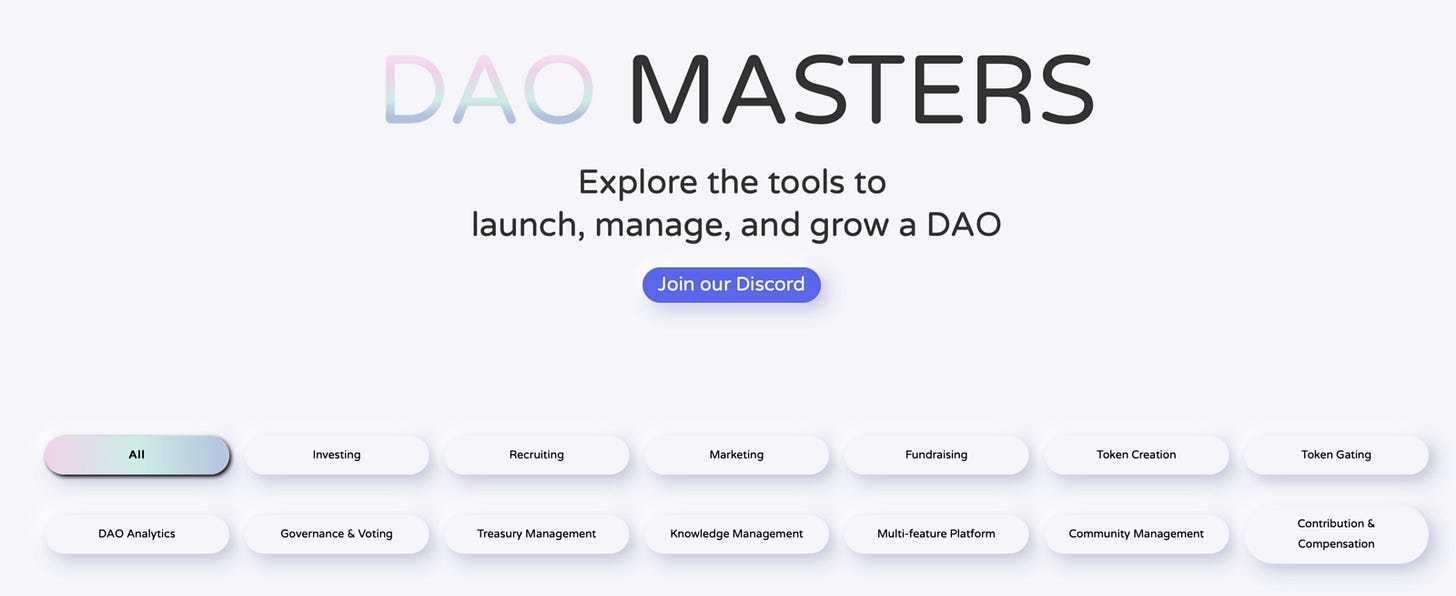History of DAOs | State of the DAO #2
You're reading State of the DAOs, the high-signal low-noise newsletter for understanding DAOs.
This week in State of the DAOs we take a look back in time at how DAOs evolved, from their early iterations to the emergent ecosystem that is unfolding today. We also feature hand-picked articles that capture the current state of DAOs, and share key insights to unlock the latest trends and ecosystem highlights.
Authors: Bankless DAO Writers Guild (gioser, Alvo von A, Adi G, hirokennelly.eth, Jake and Stake, scottyk, siddhearta, frogmonkee)
This is the official newsletter of BanklessDAO. You are subscribed to this newsletter because you were a Premium Member of the Bankless Newsletter as of May 1, 2021. To unsubscribe, edit your settings here.
A History of DAOs
Author: Gioser
Society is an endeavor in human coordination and organization. Governments organize people and the state to serve and provide for the welfare of its citizens. Politicians organize the constituents they serve. CEOs organize workers and resources to satisfy their customers. However, most of us will never sit in these positions of power, responsible for coordinating humans at scale. This divide between the coordinators and the coordinated has resulted in a disconnect in values and goals between the two groups. This is exactly why, when we try to change things around us it feels like we do not have the power to do so.
DAOs fix that.
Decentralized Autonomous Organizations are an effective way to work with like-minded people from all over the world. Think of them as an internet-native organization that is collectively managed and owned by its members. DAOs provide the tools necessary to effectively organize people and resources, making them accessible to everyone. If enough people want to work towards a common goal, they can organize themselves, and work towards changing and shaping the future as they see fit.

Or, as frogmonkee & William M Peaster articulate in their recent article, DAOs are:
Decentralized, because they are community-owned, grassroots-driven, and loosely organized (in contrast to a hierarchical, tightly-structured centralized org like a bureaucratic agency or company).
Autonomous, because their shared rules and shared treasuries are encoded and automatically enforced on the Ethereum blockchain.
Organizations, because they’re groups of people that associate and coordinate around specific purposes.
Origins of DAOs
The concept of a DAO has been around for quite a while but has flourished in earnest.
The first references to DAOs emerged in the 1990’s, to describe multi-agent systems in an Internet of Things (IoT) environment and non-violent decentralized action in the counter-globalization social movements. The contemporary meaning of DAOs can be traced back to the concept of Decentralized Autonomous Corporation (DAC), which appeared almost synonymously with Bitcoin. The DAC model was used as a concept in early forums and the chats of early crypto enthusiasts and referred to a governance model that used tokenized shares as a means of providing dividends to shareholders. As the term was linked to a corporate governance model, it was seen as too restrictive and thus was abandoned.
In late 2013, the concept re-emerged due to an article by V. Buterin, in which he suggested the term Decentralized Autonomous Organizations (DAO) to describe the ‘holy grail’ of organization types, an ‘entity that lives on the internet and exists autonomously, but also heavily relies on hiring individuals to perform certain tasks that the automaton itself cannot do.’
The most important and basic characteristics of a DAO in this sense were thought to be: “decentralized” and “autonomous”.
‘’Decentralized’’, reflects a ‘’code is law’’ organization, with the day-to-day operations based on decentralized infrastructure where the community is not controlled by a small group of shareholders or an individual.
‘’Autonomous’’, is reflected in the fact that its daily operations are programmed and automatically enforced when meeting a specific condition.
While some might argue that Bitcoin is effectively the first DAO, the term today is understood as referring not to a blockchain network in and of itself, but rather to organizations deployed as smart contracts on top of an existing blockchain network.
Evolution of DAOs
In May 2016, a few members of the Ethereum community announced the creation of the first DAO, called The DAO, which quickly became one of the biggest spectacles in the Ethereum blockchain community. Before its launch, The DAO had an initial creation period during which people could send Ether to a unique wallet address in exchange for DAO tokens on a 1-100 scale. The DAO ended up raising 12.7M Ether ($150M at the time, or $44.4B in today’s valuation). Essentially, the platform would allow people to pitch their ideas to the community and receive funding for its implementation. However, the experiment proved short-lived when The DAO was hacked one month after its launch.
The DAO hack set this space back quite a bit, effectively entering a DAO bear market. A few years after the hack the concept of DAOs started gaining traction once again as small initiatives started building. The experience of The DAO hack raised legitimate questions about whether someone should be accountable in DAOs and how to properly approach the details of governance, including how to correct flaws in the code and handle liability for losses. During 2019, or as what many called the year of the DAO, we witnessed the emergence of a variety of new concepts and projects which focused broadly on the categories of basic tooling and their application in creating DAOs. An incomplete list would include:
Aragon: A multi-chain DAO Deployment Platform that allows anyone to create and manage any organization. Aragon focuses on providing a secure way of formatting a general organization rather than building products and decision-making mechanisms around specific cases. Aragon’s government mechanism allows its token holders to oversee all decision-making proposals.
MakerDAO: An autonomous lending platform on Ethereum and the provider of the stablecoin DAI. Maker is using the DAO governance framework to make protocol governance decisions, in which, MKR holders can participate in governance polls and executive votes to make changes to the Maker protocol and governance mechanisms.
MolochDAO: Moloch is an Ethereum fund program designed to fund infrastructure projects in Ethereum (crowdfunding). MolochDAO operates in a way similar to The DAO, where people can donate ETH to the system, and existing members vote to decide whether to accept them as members. Members can submit funding proposals to the platform and vote on other funding proposals. MolochDAO, through the years, went on to inspire countless new DAOs, many of whom are direct forks of it.
DAOhaus: A no-code platform for forming and participating in community-centric DAOs, DAOhaus empowers purpose-driven communities to level up their ability to coordinate via an on-chain Moloch DAO. DAOhaus is home to hundreds of DAOs using the platform for a variety of use cases from basic coordination of shared assets for giving grants, providing services, or building a product; to NFT minting, collecting, and curation; to liquidity provision and capital formation.
The topic of DAOs governance has its own history in regard to the crypto ecosystem that won’t be fully explored here. Notably, the initiative of MolochDAO, created in January 2019, was the catalyst for the rebirth of DAOs. MolochDAO’s core innovation introduced creating an ERC-20 as the technical standard for DAO smart contracts, which inspired the creation of a series of new DAOs as direct forks to it. There is now a Cambrian explosion of DAOs, led by MolochDAO and the dozens of forks that followed (MetaCartel and others).


The Current State of DAOs
We are still in the early innings of this revolution in DAO infrastructure. Ideas regarding DAOs and their governance mechanisms have been around for quite a while, yet we are just beginning to experience the proliferation of these organizations. Alongside the growth of technically-oriented DAOs, we have lately experienced the rise of a different, socially-oriented approach to them.
Even though there is no hard line that separates these two segments, as DAOs exist on a spectrum of decentralization and autonomy, socially-oriented DAOs primarily exist to bring people together, find new ways for them to interact, assemble and collaborate.
Examples of these types of DAOs include collectives and pseudo-anonymous groups that manage funds, share their passion for artists and NFTs (PleasrDAO & FlamingoDAO), or even create media, social, and culture DAOs (BanklessDAO & FWB).
In this sense, it can be claimed that contemporary DAOs are communities of people who decide to align their ideas, values, and vision, and devote their time to creating organizations that are based on the core values of the blockchain world (openness, transparency, and decentralization).

As mentioned above, DAOs represent a shift from traditional companies in that they can be global and geographically decentralized from the start, permissionless in their access and contribution, and able to minimize frictions around employment, contracts, and identity.
While everything looks like we are moving towards a new era in regards to the structure, the functionality, and the products of a modern DAO, there is one thing we can say for sure- the types of social coordination, the degree of innovation, the flourishing of creativity, and the new ways of relating to one another that the DAOs have unlocked, is here to stay and will revolutionize our world!
Actions steps
📖 Read this mammoth piece on the Prehistory of DAOs.
⛏️ Dig deeper into our fight against Moloch.
🎧 Listen to David’s interview with Griff Green, who launched The DAO.
DAOs at a Glance
Hand-picked articles to understand the current state of the DAO ecosystem
Social Token Mid-Year Report
Author: Forefront
Forefront released their Social Token Mid-Year Report in collaboration with Coopahtroopa. We saw incredible growth so far including +500% market cap growth of popular social tokens (in aggregate) and +200% growth of addresses holding social tokens. Here are some highlights from the report:
$BANK is the most widely held social token! Followed by $WHALE and $FWB.
Seasons (fixed intervals of time) are emerging as the primary method to issue social tokens, distribute them, and organize DAO activity.
Coinvise helped >280 communities and creators launch a social token on Ethereum.
Rally is helping content creators on web2 platforms like Twitch, TikTok, Spotify and Instagram issue social tokens.
Notable raises included Forefront, FWB, Coinvise, Rally, Bitclout, and Seed Club.
NFT sales in 2021 increased by 30,000%, from $94.8m in 2020 to $13 billion in 2021.
How to DAO 201: Onboarding as Wayfinding
Author: rafa
This article by Creator Cabins does a deep dive into onboarding for DAOs and provides insights into the current state of play. Creator Cabins provides a new framework to onboard collaborators instead of the traditional unidirectional approach of sharing of knowledge and instructions.
Read this article to go down the ‘onboarding’ rabbithole and learn the following:
How onboarding in a DAO differs from a traditional corporate environment
Current onboarding practices in some of the leading DAOs — Bankless, FWB, Forefront etc.
Wayfinding as a new framework for onboarding in a DAO
How to design and implement a new onboarding process
How to DAO 301 - Contributor Rewards
Author: rafa
Creator Cabins is building a DAO that transcends online & IRL. The third installment detailing their journey dives into the topic of incentive design to motivate member contribution. It's a meme-filled article that should be bookmarked as a guide for organizations striving to establish a transparent, decentralized, fair, and sustainable rewards system. Here's a taste:
Reward Principles: What’s the north star? Identify the DAO's underlying philosophy and associated practices that are expected to foster it.
Reward Eligibility: Who should we reward? Cabin sees this as a two-pronged effort since it involves establishing the kinds of work to be recognized in addition to the role or contribution level they want to encourage.
Reward Structure: What should we reward, under what terms? Acknowledgment can come in many forms and the article provides a hypothetical template, which covers a number of scenarios.
Reward Amount: How much should we reward? There's lots of nuance to this one as remuneration can be calculated either by individual decision, algorithm, or a combination of both.
Reward Consensus: How do we agree on the reward? A DAO has to put safeguards in place to protect the treasury. Consensus for distribution can be delegated to a select group or brought to a vote.
DAOs: Absorbing the Internet
Author: The Generalist
This briefing will serve as a foundation for your understanding of DAOs. In the context of the last 200 years, companies have proved to be the dominant organizing unit to facilitate technological revolutions and societal structure. Now we have a new primitive to play with: the DAO. While each DAO varies by degree in Decentralization, Autonomy, and Organization, this technology may usher in a society of ownership and fundamentally change the dynamics of our everyday lives. This article arms you with the historical context of DAOs, the tools to start and participate in one, and a framework for understanding DAOs generally.
DAOs are a new way of organizing people. By giving people ownership in exchange for their contributions, we can create entities that transparently provide assets and capital.
Various types of DAOs have emerged to serve different use-cases. From Investment DAOs to Protocol DAOs to Social DAOs to Media DAOs. Each DAO has its own mission, organization, and vibe. While they are all DAOs that share an ethos of ownership and transparency, they may emerge in wildly different ways. Are DAOs companies? Co-ops? Networks?
We’re still early. When it comes to DAO infrastructure, influence, or AUM, they may absorb the internet, becoming the foundational building blocks of our new, web3 society. Stakeholders choose their own labor and self-organize, creating the conditions for emergent behavior. The strengths and weaknesses of these organizational primitives continue to be uncovered.
DAOs have clear vulnerabilities that have yet to be fully addressed. Sybil attacks, governance hijacking, and contract exploits are still dangers to DAOs today. The results of our incentivized owner economies are yet to be finalized. In addition, the legal status of DAOs is still in question, though being discussed.
DAO Masters
Author: Julia Lipton & Team
The DAO landscape is maturing and more DAO related tools are being developed at a breakneck speed. DAOMasters is a project to review and organize these DAO related tools. DAOMasters gives users the ability to explore the tools required to launch, manage and grow a DAO. In addition, the users can review and rate these tools.
DAOMasters was funded and built by the community. They launched their campaign on viamirror and raised 20+ ETH from 122 backers. Once the campaign was closed, DAOMasters setup a Discord where $DAOMSTR token holders joined and organized themselves in three core project teams — product, content, and community-ops.
The initial v1 of the project was completed in under six weeks. They are currently planning to organize seasons where $DAOMSTR holders will convene and decide on what to build next. Join their Discord channel and take part in the conversation.
Ecosystem Takes
🔥 and 🧊 insights from across the DAO ecosystem
Legal Structures for DAOs
Author: Anon
🔑 Insights:
There are currently five main options for structuring a DAO as a legal entity:
Don’t create a legal entity at all, which could lead to member liability for injury (think DeFi exploits) or unpaid taxes.
Incorporate in the U.S. under Wyoming’s DAO law (don’t) or as an LLC in Delaware (better).
Create an onshore foundation (Switzerland, Singapore), which reduces legal liability and gives the DAO a jurisdiction in which to pay taxes.
Create an offshore foundation (Panama, BVI, Cayman). Unlike Switzerland and Singapore, these locations are tax neutral, but most locations have other downsides, including poor optics.
Combinations of the above. The most common approach has been to mix and match: think Cayman Foundation + Singapore entity, which strikes a balance between legal liability and tax protection.
7 Takeaways After 1 Month of Contributing to a DAO
Author: Samantha Marin
🔑 Insights
DAOs are driven by a communal passion for deliberate progress.
Existing members greet newcomers with empathy and it's easy to find rewarding ways to get involved.
DAOs need better tools if they hope to achieve scale:
Decentralized collaboration is a challenge, especially when most patrons are sustained by outside work.
There isn't a handbook for what's expected. People are learning on the go and the spirit of democracy implies a lot of votes.
Decisions require considerable deliberation, which can delay progress.
Ultimately, advancing the agenda requires initiative and sometimes this conflicts with the goal of achieving trustless consensus.
Challenges notwithstanding, DAOs are going to make the world a better place.
Lisbon Surfaced The Evolution of DAOs, Solarpunks vs. Lunarpunks and Web3 Social Media
Author: David Liebowitz
🔑 Insights:
LISCON brings the cryptoverse together to discuss new developments and provide insights into where we are headed, and it’s not just west.
Most people find their way to Web3 through NFTs or play-to-earn games. This is their gateway to the metaverse. After NFTs and play-to-earn, DAOs are the next logical step for those engaged with Web3.
The future of DAO governance is in new token models and subDAOs, where decision-making is by proof of personhood or proof of participation.
Web3 is not the future, it’s now - the dream of cyberpunks has come to fruition. We are the owners of our means of production, as Web3 users own their data and content.
Solarpunk and lunarpunk are philosophical positions where their adherents agree on the transformative power of DAOs and Web3, but differ on how to solve coordination problems.
Lunarpunks hold anonymity as its highest ordering principle, and seek to build DarkFi - anonymous DeFi protocols and DAOs, and privacy-focused play-to-earn games. DarkFi is the best way to solve coordination problems - when users are safe from oppression, coordination increases.
Conversely, solarpunks seek to use open-source technology to solve coordination problems, as transparency and immutability will maximize coordination, eventually providing meaningful solutions to issues associated with climate change and public-goods funding.
BETTER LIVING THROUGH NETWORKS
Author: David Ehrlichman & Jose Mejia
🔑 Insights
This is an excerpt from David Ehrlichman’s new book “Impact Networks"
Models for organization are transitioning away from hierarchical or "command-and-control" structures.
DAOs are networks of aligned parties who are motivated by a shared purpose and strong relationships.
Diversity fosters creative problem-solving, which leads to a whole that is greater than the sum of its parts. This emergence is the quality that gives networks their exponential potential.
Why Your Group Chat Could Be Worth Millions
Author: Max Read
🔑 Insights
DAOs are blockchain-based co-ops with software constitutions.
DAOs give creators ownership of the platform they build on in proportion to their contributions.
The positivity of DAOs is a crucial part of the culture. Get rich and improve the world in one stroke.
In most DAOs, tokens reward participation, guarantee voting rights, and, importantly, are tradable — which means they can accumulate value.
While DAOs have been designated the same legal protections as LLCs in Wyoming, DAOs remain in a regulatory grey-area.
DAOs using tokens to coordinate disparate groups of people can lead to great outcomes, but if nothing of value is created, it looks more like a multi-level marketing group.
Get Plugged In
🗓️ State of the DAOs - Beginner Friendly Events
🛩️ Event Highlights
🏝 Permissionless Conference - Tickets are on sale for one of the biggest DeFi conferences! Over 5,000 people will be attending in total and every two weeks 250 more tickets unlock. Once 250 tickets are purchased, registration closes and you’ll have to wait until the next release. Speakers include our very own Ryan Sean Adams and David Hoffman, as well as many others. Join us on May 17 - 19, 2022 in sunny Palm Beach, Florida for the event.
🧑💻 DAO Global Hackathon 2021: The DAO Global Hackathon is a virtual sprint to build governance primitives, sponsored by leading DAO Infrastructure providers. Resolve technical limitations of the existing DAO tooling (Hackathon Part 1) and be free to build the next frontier of coordination primitives (Hackathon Part 2). A combined prize pool in value of +$100k, will be distributed among selected winners across track.
💻 Job Opportunities
Community Builder & Developer Evangelist at Dexible (❌technical!)
Community Manager at Aragon (❌technical!)
Community Lead at Popcorn (❌technical!)
DAO Spotlight: Olympus DAO
Stablecoins are so prevalent in DeFi because, well, they're stable. However, many investors want something that's stable, but not something that's necessarily pegged to fiat. This is where Olympus DAO comes in.
Olympus DAO introduced the $OHM token to be a free floating currency backed by a basket of assets, which the treasury will use to purchase back OHM if the token price should drop. This effectively places a floor price on OHM.
What truly makes the asset interesting is the introduction of Protocol Owned Liquidity, in which OHM owns the liquidity and in turn issues bonds. Instead of "renting" liquidity, the protocol now owns the liquidity helping to stabilize token price, promote long term growth, and capture the profit.
Olympus DAO recently released Olympus Pro, which will be offering similar bonding services for other protocols. The launch of Olympus Pro showcases that Olympus DAO is constantly looking to add value to its community and will continue to innovate.
If you'd like to learn more; check out their website, say hi to the team on their Discord, or look into integrating with their newest product; Olympus Pro.















